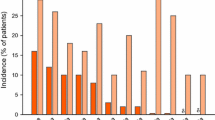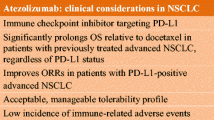Abstract
Nivolumab (Opdivo®; Nivolumab BMS™) was the first programmed death (PD)-1 immune checkpoint inhibitor to be approved for use in advanced, squamous non-small cell lung cancer (NSCLC) following prior chemotherapy. In the pivotal CheckMate 017 trial, intravenous nivolumab 3 mg/kg every 2 weeks was associated with significantly better overall survival and progression-free survival and a significantly higher overall response rate than intravenous docetaxel in the second-line treatment of advanced, squamous NSCLC. Nivolumab was also better tolerated than docetaxel in CheckMate 017, and its adverse event profile (which included immune-mediated adverse events) was manageable. In conclusion, nivolumab represents an important advance in previously-treated, advanced, squamous NSCLC.

Similar content being viewed by others
References
Reck M, Popat S, Reinmuth N, et al. Metastatic non-small-cell lung cancer (NSCLC): ESMO Clinical Practice Guidelines for diagnosis, treatment and follow-up. Ann Oncol. 2014;25(Suppl 3):iii27–39.
National Comprehensive Cancer Network. NCCN clinical practice guidelines in oncology: non-small cell lung cancer (version 7.2015). 2015. http://www.nccn.org/. Accessed 12 Oct 2015.
Zielinski C, Knapp S, Mascaux C, et al. Rationale for targeting the immune system through checkpoint molecule blockade in the treatment of non-small-cell lung cancer. Ann Oncol. 2013;24(5):1170–9.
Wang C, Thudium KB, Han M, et al. In vitro characterization of the anti-PD-1 antibody nivolumab, BMS-936558, and in vivo toxicology in non-human primates. Cancer Immunol Res. 2014;2(9):846–56.
Taube JM, Klein A, Brahmer JR, et al. Association of PD-1, PD-1 ligands, and other features of the tumor immune microenvironment with response to anti-PD-1 therapy. Clin Cancer Res. 2014;20(19):5064–74.
Homet Moreno B, Ribas A. Anti-programmed cell death protein-1/ligand-1 therapy in different cancers. Br J Cancer. 2015;112(9):1421–7.
Brahmer JR, Hammers H, Lipson EJ. Nivolumab: targeting PD-1 to bolster antitumor immunity. Future Oncol. 2015;11(9):1307–26.
Bristol-Myers Squibb Company. Opdivo (nivolumab) injection, for intravenous use: US prescribing information. 2015. http://packageinserts.bms.com/pi/pi_opdivo.pdf. Accessed 12 Oct 2015.
European Medicines Agency. Nivolumab BMS: EU summary of product characteristics. 2015. http://www.ema.europa.eu. Accessed 12 Oct 2015.
European Medicines Agency. Opdivo (nivolumab): EU summary of product characteristics. 2015. http://www.ema.europa.eu. Accessed 12 Oct 2015.
Food and Drug Administration. FDA expands approved use of Opdivo in advanced lung cancer. 2015. http://www.fda.gov/NewsEvents/Newsroom/PressAnnouncements/ucm466413.htm. Accessed 12 Oct 2015.
Berman D, Korman A, Peck R, et al. The development of immunomodulatory monoclonal antibodies as a new therapeutic modality for cancer: the Bristol-Myers Squibb experience. Pharmacol Ther. 2015;148:132–53.
Brahmer JR, Drake CG, Wollner I, et al. Phase I study of single-agent anti-programmed death-1 (MDX-1106) in refractory solid tumors: safety, clinical activity, pharmacodynamics, and immunologic correlates. J Clin Oncol. 2010;28(19):3167–75.
Topalian SL, Hodi FS, Brahmer JR, et al. Safety, activity, and immune correlates of anti-PD-1 antibody in cancer. N Engl J Med. 2012;366(26):2443–54.
Brahmer J. Treatment targeting PD1/PDL1 and toxicity [abstract no. MS09.2]. J Thorac Oncol. 2013;8(Suppl 2):S53–4.
Passey C, Simon J, Roy A, et al. Assessment of drug interaction potential by nivolumab using cytokine modulation data [abstract no. 118 plus poster]. In: American Society for Clinical Pharmacology and Therapeutics Annual Meeting. 2015.
Agrawal S, Williams D, Waxman I, et al. Absence of QT prolongation effect by nivolumab or ipilimumab in patients with solid tumors [abstract no. 117 plus poster]. In: American Society for Clinical Pharmacology and Therapeutics Annual Meeting. 2015.
Feng Y, Bajaj G, Wang X, et al. Model-based analysis of nivolumab to support clinical pharmacology profiling in subjects with solid tumors [abstract]. Clin Pharmacol Ther. 2015;97(Suppl 1):S41–2.
Agrawal S, Feng Y, Kollia G, et al. Clinical pharmacokinetics (PK) of BMS-936558, a fully human anti-PD-1 monoclonal antibody [abstract no. TPS2622]. J Clin Oncol. 2012;30(15 Suppl).
Feng Y, Wang X, Agrawal S, et al. Nivolumab exposure-response (E-R) analysis for clinical development of nivolumab in advanced refractory squamous non-small cell lung cancer [abstract no. QP-19]. Clin Pharmacol Ther. 2015;97(Suppl 1):S7.
Agrawal S, Roy A, Feng Y, et al. Immunogenicity of nivolumab and its impact on pharmacokinetics and safety in subjects with metastatic solid tumors [abstract no. 115 plus poster]. In: American Society for Clinical Pharmacology and Therapeutics Annual Meeting. 2015.
Gettinger SN, Horn L, Gandhi L, et al. Overall survival and long-term safety of nivolumab (anti-programmed death 1 antibody, BMS-936558, ONO-4538) in patients with previously treated advanced non-small-cell lung cancer. J Clin Oncol. 2015;33(18):2004–12.
Rizvi NA, Mazières J, Planchard D, et al. Activity and safety of nivolumab, an anti-PD-1 immune checkpoint inhibitor, for patients with advanced, refractory squamous non-small-cell lung cancer (CheckMate 063): a phase 2, single-arm trial. Lancet Oncol. 2015;16(3):257–65.
Sakai H, Nishio M, Hida T, et al. Phase II studies of nivolumab in patients with advanced squamous (SQ) or non-squamous (NSQ) non-small cell lung cancer (NSCLC) [abstract no. 521 plus poster]. Eur J Cancer. 2015;51(Suppl 3):S110.
Brahmer J, Reckamp KL, Baas P, et al. Nivolumab versus docetaxel in advanced squamous-cell non-small-cell lung cancer. N Engl J Med. 2015;373(2):123–35.
Horn L, Rizvi N, Mazières J, et al. Longer-term follow-up of a phase 2 study (CheckMate 063) of nivolumab in patients with advanced refractory squamous (SQ) non-small cell lung cancer (NSCLC) [abstract plus slide presentation]. In: 16th World Conference on Lung Cancer. 2015.
Reckamp K, Spigel DR, Rizvi N, et al. Phase 3, global, randomized trial (CheckMate 017) of nivolumab vs docetaxel in advanced squamous (SQ) cel non-small cell lung cancer (NSCLC) [abstract plus slide presentation]. In: 16th World Conference on Lung Cancer. 2015.
Reck M, Coon C, Taylor F, et al. Evaluation of overall health status in patients with advanced squamous non-small cell lung cancer treated with nivolumab or docetaxel in CheckMate 017 [abstract no. 3011]. Eur J Cancer. 2015;51(Suppl 3):S599.
Gralla RJ, Coon C, Taylor F, et al. Evaluation of disease-related symptoms in patients with advanced squamous non-small cell lung cancer treated with nivolumab or docetaxel [abstract plus slide presentation]. In: 16th World Conference on Lung Cancer. 2015.
Sacher AG, Le LW, Lau A, et al. Real-world chemotherapy treatment patterns in metastatic non-small cell lung cancer: are patients undertreated? Cancer. 2015;121(15):2562–9.
Al-Farsi A, Ellis PM. Treatment paradigms for patients with metastatic non-small cell lung cancer, squamous lung cancer: first, second, and third-line. Front Oncol. 2014;4:157.
Sundar R, Cho B-C, Brahmer JR, et al. Nivolumab in NSCLC: latest evidence and clinical potential. Ther Adv Med Oncol. 2015;7(2):85–96.
Garon EB, Rizvi NA, Hui R, et al. Pembrolizumab for the treatment of non-small-cell lung cancer. N Engl J Med. 2015;372(21):2018–28.
Merck & Co Inc. Keytruada (pembrolizumab): US prescribing information. 2015. http://www.keytruda.com. Accessed 12 Oct 2015.
Food and Drug Administration. List of cleared or approved companion diagnostic devices (in vitro and imaging tools). 2015. http://www.fda.gov/MedicalDevices/ProductsandMedicalProcedures/InVitroDiagnostics/ucm301431.htm. Accessed 12 Oct 2015.
Penrod JR, Korytowsky B, Petrilla A, et al. Survival of U.S. Medicare patients with advanced non-small cell lung cancer by line of therapy [abstract no. 6582]. J Clin Oncol. 2014;32(15 Suppl).
Massarelli E, Andre F, Liu DD, et al. A retrospective analysis of the outcome of patients who have received two prior chemotherapy regimens including platinum and docetaxel for recurrent non-small-cell lung cancer. Lung Cancer. 2003;39(1):55–61.
Scartozzi M, Mazzanti P, Giampieri R, et al. Clinical predictive factors for advanced non-small cell lung cancer (NSCLC) patients receiving third-line therapy: selecting the unselectable? Lung Cancer. 2010;68(3):433–7.
European Medicines Agency. Nivolumab BMS: assessment report. 2015. http://www.ema.europa.eu. Accessed 12 Oct 2015.
Hussein M, McCleod M, Chandler J, et al. Safety and efficacy of nivolumab in an ongoing trial of a PD-L1+/− patient population with metastatic non-small cell lung cancer [abstract plus slide presentation] In: 16th World Conference on Lung Cancer. 2015.
Borghaei H, Paz-Ares L, Horn L, et al. Nivolumab versus docetaxel in advanced nonsquamous non-small-cell lung cancer. New Engl J Med. 2015. doi:10.1056/NEJMoa1507643.
Robert C, Long GV, Brady B, et al. Nivolumab in previously untreated melanoma without BRAF mutation. N Engl J Med. 2015;372(4):320–30.
Rajan A, Gulley JL. Nivolumab (anti-PD-1, BMS-936558, ONO-4538) in patients with advanced non-small cell lung cancer. Transl Lung Cancer Res. 2014;3(6):403–5.
Mahoney KM, Atkins MB. Prognostic and predictive markers for the new immunotherapies. Oncology (Williston Park, NY). 2014;28(Suppl 3):39–48.
Gettinger SN, Hellmann MD, Shepherd FA, et al. First-line monotherapy with nivolumab (NIVO) in advanced non-small cell lung cancer (NSCLC): safety, efficacy, and biomarker analysis [abstract no. 3096]. Eur J Cancer. 2015;51(Suppl 3):S632.
Gettinger S, Chow LQ, Borghaei H, et al. Safety and response with nivolumab (anti-PD-1; BMS-936558, ONO-4538) plus erlotinib in patients (PTS) with epidermal growth factor receptor mutant (EGFR MT) advanced non-small cell lung cancer (NSCLC) [abstract no. 171]. Int J Radiat Oncol Biol Phys. 2014;90(5 Suppl):S34–5.
Gettinger S, Rizvi N, Chow LQ, et al. Nivolumab (anti-PD-1; BMS-936558, ONO-4538) in combination with platinum-based doublet chemotherapy (PT-DC) or erlotinib (ERL) in advanced non-small cell lung cancer (NSCLC) [abstract no. 1054PD]. Ann Oncol. 2014;25(Suppl 4).
Hellmann MD, Rizvi N, Gettinger SN, et al. Safety and efficacy of first-line nivolumab (NIVO) and ipilimumab (IPI) in non-small cell lung cancer (NSCLC) [abstract no. 3097]. Eur J Cancer. 2015;51(Suppl 3):S632.
Rizvi NA, Antonia SJ, Shepherd FA, et al. Nivolumab (anti-PD-1; BMS-936558, ONO-4538) maintenance as monotherapy or in combination with bevacizumab (BEV) for non-small cell lung cancer (NSCLC) previously treated with chemotherapy [abstract]. Int J Radiat Oncol Biol Phys. 2014;90(5 Suppl):S32.
Acknowledgments
During the peer review process, the manufacturer of nivolumab was also offered an opportunity to review this article. Changes resulting from comments received were made on the basis of scientific and editorial merit.
Author information
Authors and Affiliations
Corresponding author
Ethics declarations
Funding
The preparation of this review was not supported by any external funding.
Conflicts of interest
Gillian Keating is a salaried employee of Adis/Springer, is responsible for the article content and declares no relevant conflicts of interest.
Additional information
The manuscript was reviewed by: J. G. Aerts, Department of Pulmonary Medicine, Erasmus MC Cancer Institute, Rotterdam, The Netherlands; C. Chouaïd, Service de Pneumologie, GRC Onco Paris Est, UPEC, CHI Créteil, Créteil, France; L. Crinò, Division of Medical Oncology, Santa Maria della Misericordia Hospital, Azienda Ospedaliera di Perugia, Perugia, Italy; J. Mazières, Thoracic Oncology Department, Larrey Hospital, University Hospital of Toulouse, University of Toulouse III (Paul Sabatier), Toulouse, France; A. Pluzanski, Lung Cancer Department, Maria Sklodowska-Curie Memorial Cancer Centre and Institute of Oncology, Warsaw, Poland.
Rights and permissions
About this article
Cite this article
Keating, G.M. Nivolumab: A Review in Advanced Squamous Non-Small Cell Lung Cancer. Drugs 75, 1925–1934 (2015). https://doi.org/10.1007/s40265-015-0492-9
Published:
Issue Date:
DOI: https://doi.org/10.1007/s40265-015-0492-9




